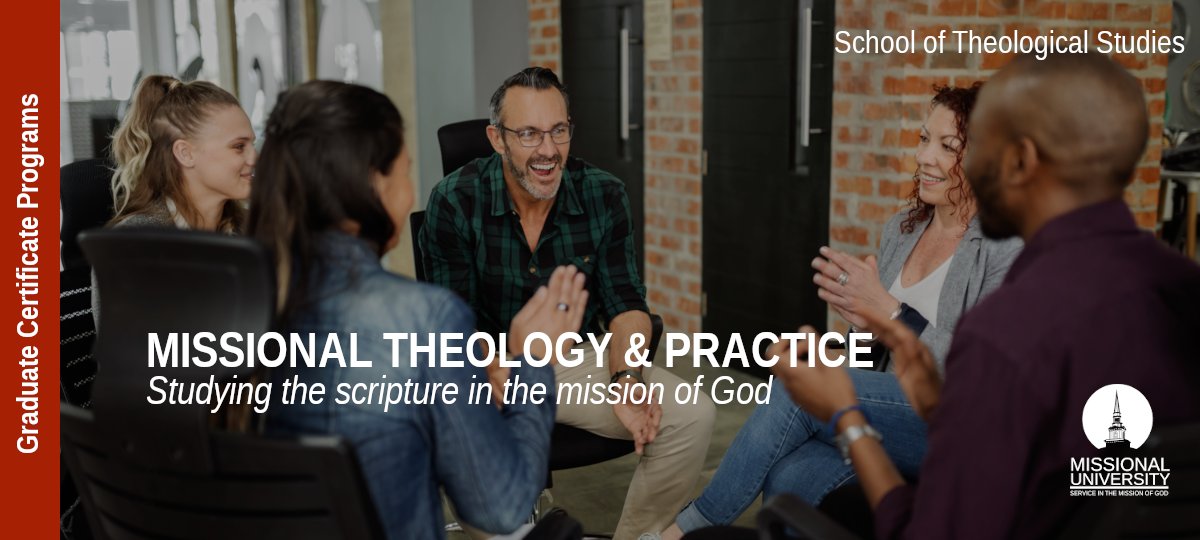
Online Graduate Certificate in
Missional Theology & Practice
☀ Totally Unique Program = only available at Missional University
Expand Your Missional Service Today!
REQUEST INFORMATION
Ready to learn more about the
Graduate Certificate in
Missional Theology & Practice?
LEARN MORE NOW
The Graduate Certificate in Missional Theology & Practice equips students to understand the biblical and theological foundations for missional engagement in a variety of cultures and life contexts. The program is driven by the assumption that all belief and all action is grounded in theology, whether articulated or not. Students learn how to articulate a theology for missional engagement as they serve in God's redemptive mission.
Service in the mission of God occurs among those both within the faith community and those outside. However in an ever religiously antagonistic world, the Graduate Certificate in Missional Theology & Practice encourages students to evaluate the missional ethos, ethics, proclamation and witness of the early church as a foundation for developing a 21st century, biblically-informed approach to missional engagement in diverse settings. Students develop a theological framework for mission that is grounded in the practice of Jesus, the apostles and the Christians of the early church.
Program Features
-
Integrated practicums allow you to gain valuable real-world experience
-
Learn from academic practitioners from around the world
-
Credits earned in this certificate program can apply to a Missional University Master's degree program
Course Effort
Course Length
Credits Required
Program Cost
What Will I Study?
We offer the most comprehensive approach to studying the scriptures in the mission of God.
An investigation of the biblical theology of mission. The student will analyze three distinct but interrelated areas: The biblical and theological foundations of mission; the Kingdom of God as the theme of mission; and progressive revelation throughout salvation history. The student will be able to construct his/her own mission theological framework.
The Christian scriptures hold the key to the understanding and the praxis of God’s mission. This course examines issues related to the historical context of the biblical text, the role of the interpreter’s social context, and the location of missions in understanding the Bible and participating in the mission of God in today’s multi-cultural and multi-religious context.
Students will understand and evaluate various models for how the Church negotiates its position vis-à-vis those deemed outside the community. This course will utilize the methods of the social sciences, including, social-identity theory and social psychology, for the purposes of better understanding how the early Church addressed its own distinctives in diverse cultures and contexts. This will be done for the purpose of translating the earliest practices into the contemporary Church in its worldwide diversity. Student evaluation will include reading, lectures, discussion forums, an essay, an exam, and a service project.
Will focus on the relationship between ethics and mission in the early Church for the sake of the Church’s ongoing mission. Social scientific research, theories, and models will be utilized and evaluated in order to understand and categorize behavior towards those deemed outside an individual’s group identity. Structurally, the course will contain reading assignments, lectures, discussions, an essay, an exam, and a hands on service project.
Examines the New Testaments models of contextualization and bring them into theological conversation with the student’s lived experience of context. The student will evaluate how these Biblical accounts might offer a faithful pattern of missional engagement that can serve as a model for mission today.
A sociocultural, rhetorical, and historical analysis of the proclamation and witness of Jesus and the Apostles and its implication for message development in varous cultural contexts. Students will analyze the structure and delivery of biblical proclamation in terms of its audience and intent in order to discern ways culture and context contribute to the formation of theological approaches to missional proclamation. Students will craft contemporary messages and approaches using New Testament models of proclamation and witness designed for an unreached or underserved group of people of their choosing.
When Can I Get Started?
We offer multiple start dates each year to give you flexibility in your education, life and work schedules.
JANUARY
MARCH
MAY
AUGUST
OCTOBER
A Career in Joining the Mission of God
Is this Your Mission?
Pastor, Church Planter, Missionary, Missional Community Leader, Pastoral Staff member, Outreach Leader, Church Minister of Mission, Director of Mission, Discipleship Director, Biblical Studies Blogger, Biblical Studies Editor, Biblical Studies Educator, Biblical Studies Writer
Request Information Now
How Much Will it Cost?
We offer tuition based upon country of residence. According to the Human Development Index, all countries around the world fall into one of four categories:
-
(Tier 1) - Very High Human Development
-
(Tier 2) High Human Development
-
(Tier 3) Medium Human Development
-
(Tier 4) Low Human Development
Our tiered global tuition makes higher education affordable for everyone world wide.

TIER COUNTRIES
100% Tuition
$395
per credit hour
3 credit course
$1185

TIER COUNTRIES
80% Tuition
$316
per credit hour
3 credit course
$948

TIER COUNTRIES
60% Tuition
$237
per credit hour
3 credit course
$711

TIER COUNTRIES
40% Tuition
$158
per credit hour
3 credit course
$474
Tiered tuition based on country of origin and scholarships available. Find your country of residence here for more information.
Tuition may be further reduced by participating in the Sponsorship Program.
